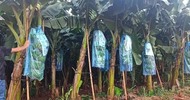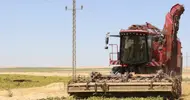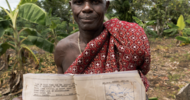As losses from Karuturi's Ethiopian farm operations mount, over 3,000 workers from the company's flower farm in Kenya down their tools to protest non-payment of their salaries and poor working conditions.
- The Star
-
05 December 2012
A slide show by GRAIN that profiles some of those who have been most actively pursuing or supporting farmland grabs around the world.
The company has approached the African Development Bank, the African Export-Import Bank and the Eastern and Southern African Trade and Development Bank to raise another $100 million for a sugarcane estate.
Despite the lucrative returns that foreign investors can achieve by investing in African agriculture, the on-the-ground realities of operating in the continent is often less rosy.
- HowWeMadeItInAfrica
-
09 June 2012
Karuturi, which has 300,000 ha in Ethiopia, is now targeting the DRC, Tanzania, Mozambique, Senegal and Sierra Leone.
- Business World
-
02 June 2012
Indian-listed Karuturi Global, which has leased land in Ethiopia for commercial farming, plans to export cereals, sugar and edible oil to South Sudan and Kenya upon completing cultivation in 2014.
How corporate transparency encourages secrecy - the counterproductive role of many NGO's.
- Rural Modernity
-
07 April 2012
Largest cut flower exporter Karuturi Global ventures into food business
- Business Today
-
28 Mar 2012
Company looks to tide over land-grabbing allegations, devastating flood for its $300mn project in Ethiopia.
- Business Standard
-
26 Mar 2012
"Galaxy of diplomats" in attendance for the inauguration of Mr Sai Ramakrishna Karuturi, Managing Director of Karuturi Global Ltd, as an Honorary Consul of Ethiopia in Bangalore.
- Business Wire
-
29 February 2012
“I wouldn’t define it as land grabbing. We exploit the economic opportunities which came about after the food price shock of 2007,” says Birinder Singh, the manager of Karuturi Agro Products. BBC slideshow.
The growing insecurity and violence in Gambela, seen in the recent loss of human lives and attacks on government institutions, should be seen as a clear warning to investors about the dangers involved in large scale agricultural investments, says the Anywaa Survival Organisation.















